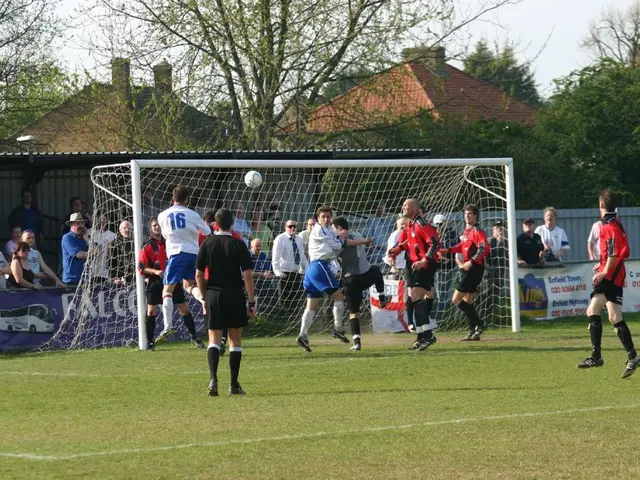Skidding Toward an Authoritarian US? A Rough Ride or a Slide into Darkness?
Slide towards authoritarian rule in the U.S.: Determining the extent of the shift.
In today's vague landscape of politics, the chatter is loud and clear: the grand ol' U.S. of A, former beacon of democracy, defender of human rights, and the leader of the free world, is no longer what it once was. Instead, it finds itself sabotaging its own political system under the rule of President Donald Trump, a man who tramples democratic norms and justice with his dogmatic decrees, public smear campaigns, and incessant craving for power.
The question on everyone's lips: Are we in an autocracy yet? Researchers across the spectrum seem to agree: the U.S. is skidding in that direction. But how far have we really come?
Trump's ideological car wreck has destroyed the pillars of our democratic system one by one: separation of powers, the rule of law, freedom of speech, free press, and even education, research, and culture. His government's overreach has led some academics and analysts to describe the U.S. as a 'competitive authoritarian' state[1][2], akin to countries like Hungary, Turkey, or Venezuela. Yet, it's worth noting that with robust democratic institutions still in place, the U.S. has yet to fully transition into this form of governance[1][2].
Take a stroll down memory lane, remember when historian Timothy Snyder coined the term "coup" just weeks into Trump's presidency? Snyder warned of the fateful collision between tech billionaire Elon Musk and his 'Ministry of Government Efficiency' team, who gained access to sensitive U.S. databases, claiming they had no right to hold such power[3]. Some of the new administration's measures have since been stopped or limited by courts, with Musk stepping back from his daily government work. Yet, the changes made are likely to endure throughout Trump's presidency[3].
New technologies, as Snyder pointed out, can empower autocratic figures. It's as though the old guard invited a couple of tech-savvy bros to reboot their house for a few months, altering data, violating privacy, and leaving the family unsure about the true state of their digital fortress.
Resistance remains, primarily from the courts. The White House spits venom at individual judges, applying immense pressure on them[3]. Some decrees have been blocked or turned out to be less than they seemed, with legal defenses becoming an expensive burden for those who stand against the tide[3].
Trump's methods and policies could entangle him in political and legal quagmires for years to come. Yet, one must wonder if future presidents will follow suit, wielding power with similar autocratic glee or even pushing the boundaries even further[3].
While the U.S. constitutional framework remains strong, it is the loopholes and systemic weaknesses that Trump and his administration can exploit to sow seeds of autocracy[1][2]. Unlimited corporate financing of elections and the Supreme Court's recent immunity ruling have made Trump's power and corruption possible[1][2]. It's a stark reminder that even in a vibrant democracy, it's essential to maintain a watchful eye on those wielding power.
In the end, the trajectory of the U.S. remains up in the air, swaying between competitive authoritarianism and a return to democratic norms. The future depends on the goodwill and commitment of those who serve and elect our leaders. Will we witness a power relinquishment that upholds democratic ideals or a continued, relentless slide into autocracy? Only time will tell.
References:[1] Diamond, L. (2021). Authoritarianism in the U.S. Niskanen Center. https://www.niskanencenter.org/blog/authoritarianism-in-the-us/[2] Levitsky, S., & Way, L. (2010). Competitive Authoritarianism: Hybrid Regimes after the Cold War. Journal of Democracy, 21(1), 13-30. https://www.jstor.org/stable/41053476[3] Niles, K. (2017). In Trump's first weeks, is it already a coup? American Prospect. https://prospect.org/politics/trump-coup/
- The European Union watches closely as the United States skids towards an authoritarian regime under President Donald Trump.
- Autocracy is a real concern, with researchers describing the U.S. as a 'competitive authoritarian' state, akin to countries like Hungary, Turkey, or Venezuela.
- Trump's ideological car wreck has destroyed the pillars of democracy, such as separation of powers, the rule of law, and free speech.
- New technologies, like WhatsApp and social media, can empower autocratic figures and have allowed Trump's overreach to occur.
- Movies-and-TV and pop-culture are used as a distraction from war-and-conflicts, crime-and-justice, and general-news, while celebrities remain silent on important political issues.
- Policy-and-legislation aimed at restricting books and academic research undermines democratic ideals and limits freedom of thought.
- In entertainment, sci-fi-and-fantasy often predicts future events, which makes it a powerful tool in understanding the potential slide into autocracy.
- Car-accidents, fires, sports, and weather have become politicized under the Trump administration, using them to divert attention from more pressing democratic issues.
- Politics is no longer about unity and progress but power and personal gains, with Trump setting a dangerous precedent.
- Here, football, soccer, NBA, MLB, NHL, golf, sports-betting, European leagues, basketball, and even horse-racing can be used to discuss political biases and social issues.
- Sports-analysis has turned into political punditry, with coaches and players using their platforms to speak out against Trump and his policies.
- Weather-forecasting has become a weapon used by the administration to discredit hundreds of climate scientists and climate-change research.
- Auto-racing, mixed-martial-arts, and premier-league are just a few examples of areas where athletes have been outspoken about political issues, pushing back against the rising tide of autocracy.
- American-football, tennis, and tennis-analysis have also become platforms for athletes and commentators to discuss issues of justice, equality, and human rights.
- Sports is often seen as a unifying force, but in this era, it has become a battleground for ideological warfare.
- Seria-A, Laliga, and NCAA-football have been affected by the political changes in the United States, with some players choosing to take a stand against Trump's policies.
- NFL players have taken a knee in protest against police brutality and racial inequality, sparking a heated debate in both the sports world and politics.
- Sports-betting and gambling have been targeted for government control and regulation, further eroding democratic norms and individual freedoms.
- Trump's administration has used crime-and-justice and accidents as tools to justify its autocratic policies, with a focus on fear-mongering and the suppression of dissent.
- The courts remain one of the last bastions of hope in preventing the U.S. from transitioning into a full-blown autocracy.
- Courts have blocked or limited several of Trump's decrees, but the constant venom and pressure on individual judges make their jobs difficult and challenging.
- Legal defenses have become an expensive burden for those who stand against the tide, facing immense political and legal challenges.
- Trump's methods and policies could entangle him in legal quagmires for years to come, but there is a risk that future presidents will follow suit.
- Even with Trump's presidency nearing an end, the future trajectory of the U.S. remains uncertain, swaying between competitive authoritarianism and a return to democratic norms.
- The future depends on the goodwill and commitment of those who serve and elect our leaders, to ensure a power relinquishment that upholds democratic ideals.
- In a vibrant democracy, it's essential to maintain a watchful eye on those wielding power, to prevent loopholes and systemic weaknesses from being exploited to sow seeds of autocracy.
- Autocracy, in its many forms, has no place in a democratic society and the European Union will support a return to democratic norms and values in the United States.








